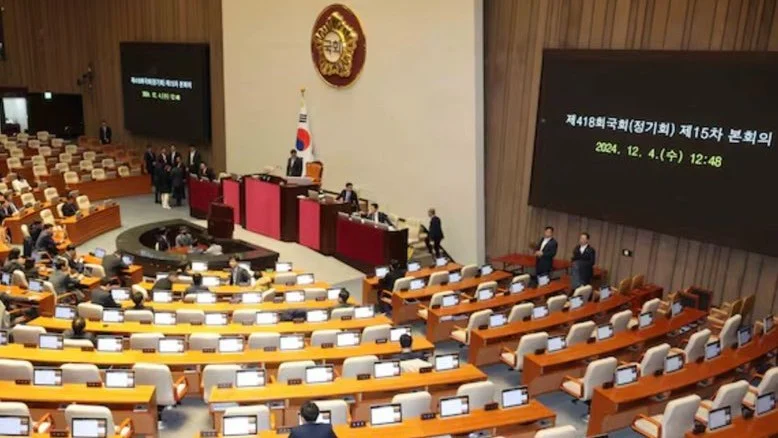South Korean President Yoon Suk Yeol declared martial law late Tuesday, citing threats to the nation’s constitutional order by opposition parties allegedly sympathetic to North Korea. The move came amid escalating political tensions between Yoon’s People Power Party and the opposition Democratic Party. However, the martial law was lifted early Wednesday after South Korea’s parliament overwhelmingly voted against it.
Timeline of Events
Martial Law Declaration
President Yoon announced the emergency martial law, accusing “anti-state forces” of destabilizing the country. In a televised address, Yoon vowed to “protect the free Republic of Korea from national ruin” and eliminate subversive threats.
Parliament Sealed Off
Reports indicated that the entrance to the National Assembly was blocked, with security forces stationed outside. Helicopters were seen landing on the roof of the building, adding to the heightened tension.
Restrictions Imposed
According to Yonhap News Agency, the military prohibited political activities, placed media under government control, and banned public gatherings, including strikes and protests.
Parliament Overturns Martial Law
Early Wednesday, South Korea’s parliament voted overwhelmingly to reject martial law, passing a resolution with 190 out of 300 lawmakers present. National Assembly Speaker Woo Won-shik declared the martial law null and void. Despite the vote, the military initially stated it would maintain martial law until formally lifted by the president.
Public Protests and Resistance
Crowds of protesters gathered near the National Assembly, demanding the withdrawal of martial law and calling for President Yoon’s resignation. Police were deployed to control the protests, which included scuffles with authorities. Some demonstrators chanted, “Withdraw emergency martial law!” and “Arrest Yoon Suk Yeol!”
Justification and Opposition Response
Yoon defended the imposition of martial law, arguing it was necessary to protect South Korea’s liberal democracy from “anti-state forces.” He criticized the opposition for budget cuts that he claimed jeopardized public security.
The decision drew immediate condemnation. Opposition leader Lee Jae-myung, who narrowly lost the 2022 presidential election to Yoon, called the move “illegal and unconstitutional.” Han Dong-hoon, a prominent conservative figure, also denounced the declaration and vowed to oppose it.
Martial Law Decree Highlights
The martial law decree, translated by Reuters, outlined sweeping restrictions:
- Ban on Political Activities: All political activities, including those of the National Assembly and political parties, were prohibited.
- Media Control: All media and publications were placed under the control of the Martial Law Command.
- Prohibition of Strikes and Protests: Strikes, rallies, and demonstrations were banned.
- Medical Personnel Recall: Striking medical personnel were ordered to return to work within 48 hours under threat of punishment.
Conclusion
Following the parliament’s rejection and mounting public pressure, President Yoon announced the withdrawal of military personnel and a formal end to martial law. The incident has deepened political divisions in South Korea, with the legality and implications of Yoon’s actions likely to remain a contentious issue in the coming weeks.






